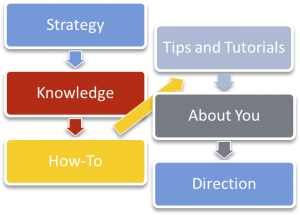Every good politician comes fully equipped with a speech writer to help them craft their message. We know this, but when these political figures get up and deliver the speech, we like to believe it’s theirs, just as if they wrote it themselves. There is no shame in that!
So why shouldn’t bloggers have someone write their blog posts for them? No, I’m not talking about ghostwriters, but I am talking about audience participation in every blog post you write. Traditionally, audience participation in blog posts comes after the post is written and published, in the form of comments. But smarter bloggers get their audience participating before even the first blog post is written. It may not be active participation, but the audience is involved nonetheless.
Blogging doesn’t start with your own ideas, it starts with your audience’s ideas. It starts with knowing what they want to learn. It starts with delivering information that peaks their interests, not yours. Every blogger can – and should – be utilizing its audience before writing the first sentence in any single blog post. Your blog needs to be written for your audience, not for quenching your own narcissistic urges.
Find Your Target Audience
Before you can use your audience to help you write any blog posts, you first have to know a little something about them. Who are they (or, who will they be)? Who in this great world wide web will be interested in reading your ramblings?

A better way to think about this is, what can you write that will attract the audience you’re looking for?
What you write can, and will, change drastically depending on who you’re writing for. The topics may be similar, but the style and specific content of the writing will change. Understanding who your audience is, or will be, help you craft the right message for their needs.
Having this understanding of your audience will help you determine what the message will be. You no longer have to be concerned about the message because it’s determined by your audience. Knowing what they like, want, enjoy, appreciate and tune into will tell you exactly what to write about.
What Does Your Audience Want to Learn?

There is a lot to learn in this world, and, much to my chagrin, it doesn’t all revolve around movie quotes you can randomly slip into a conversation. Blog readers are there for a reason; they want to learn. But what do they want to learn? What is it that will most benefit them?
Chances are you’ll have an audience that is looking for different types of content. That gives you a greater challenge to meet those content needs, but also more freedom to create varied content. But be sure not to go too far in any one direction, or else you risk alienating a core piece of your audience.
The goal is to ensure every reader leaves having felt like they learned something. This means that every message and every blog post must be written in a way that ensures readers will gain some knowledge or insight they didn’t already have. That can include a new tip, some direction they hadn’t otherwise received, or even something about you or your company they didn’t know.
While you’re not exactly getting your audience to write your blog posts, this understanding will make sure you are meeting their needs. Regardless of who your audience is or what they want to learn, writing your blog posts for them is the best way to build, maintain and convert your audience into true followers.
